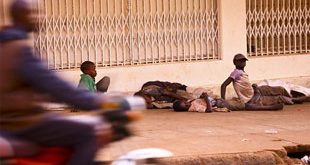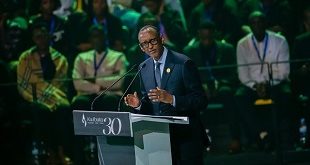The President’s reconciliatory visit to Miria Obote reveals a truth he has run from for more than 30 years
When Museveni first came to power, he used to talk a lot about the NRM line being correct. He no longer does so. This is because the line has not only proved itself erroneous, it has been abandoned altogether. My acquaintance with Museveni’s political line is long. I first came across it in the early seventies. And in this article I will attempt to share my observations.
The Idi Amin coup (January 1971) found me at the University of Nairobi. From there I did not come back to Uganda; I went to Dar es Salaam where Dr Apollo Milton Obote and the anti-Amin struggle were based.

When I got there, I found that my age-mates such as Museveni and Kategaya were relatively more politically advanced. They had had the advantage of going trough the University of Dar es salaam, the centre of East Africa’s left-wing at the time. The place was teeming with left-wing academics and had a bookshop well stocked with left-wing literature. Even courses at the university were imbuing students with left-wing ideas.
I realised I had to catch up and threw myself into reading in a frenzy. In due course I came across writers like Regis Debray, Walter Rodney and Franz Fanon, who were in vogue at the time and they convinced me that what Museveni was saying with regards to the struggle against Idi Amin was the correct path. I therefore joined the Museveni camp and even became a member of the Central Committee of Fronasa.
Our objective was to bring about a Cuban type of revolution in Uganda. I know some members of the NRM are bound to try and deny this. However I will refer them to a statement by Maj. Gen. Caleb Akandwanaho, a.k.a. Salim Saleh, a senior cadre of NRM and brother to Museveni. In The Monitor of Wednesday, November, 2006, Salim Saleh clearly stated:
“A small group of fighters, with 27 guns, without external assistance for much of the time and without a rear base in any neighbouring country, defeating a government that had a force of almost 60,000 soldiers in a record time of five years, is almost un-paralleled in the history of revolutionary warfare.The only similar case in the world is that of Fidel Castro in Cuba. After the initial setback of losing most of his fighters to the Batista Airforce, he gathered 12 survivors with whom he headed to the Sierra Maestra Mountains from where he, eventually, defeated the dictatorship.”
Regis Rebray was telling us that all we needed was adopt the foco theory of revolution or focalism (Spanish foquismo). Focalism was the erroneous revolutionary theory developed by Regis Debray and inspired by Che Guevara’s erroneous reading of the Cuban revolution. The central principle of this theory was vanguardism by cadres of small fast-moving paramilitary groups that provide focus for popular discontent against sitting regimes, and thereby lead to a general insurrection.
However, as I studied further I soon came to realise that t he ideology then guiding Fronasa was half-baked. It might have been high-sounding but it really could not explain our situation in Uganda at the time, or even now. I also came to realise there was no way a Cuban-type revolution could occur in Uganda at that time. More revolutionary work was necessary before such a revolution could be contemplated. And the kind of preparatory work that was necessary was being done by the Uganda Peoples Congress. That is when I left Fronasa and returned to UPC.
UPC had been engaged in the struggle for national-democratic liberation. By that was meant as a movement to eliminate national and colonial oppression (to say nothing of winning economic independence and the attendant tasks of socio-economic progress) as well as mould the nation of Uganda. It also was a movement of breaking up feudal and pre-feudal relations.
In the past epochs these historic tasks were called bourgeois or bourgeois democratic. This was so because the tasks, in places like the United States of America in the 18th century, were not only undertaken to bring about a bourgeois society, but were also led by the bourgeoisie. It is the bourgeois character of the leadership as well as the bourgeois interests the revolutions served that determined the character of these revolutions.
The revolution that UPC, under the leadership of Obote, was carrying out was not being led by the bourgeoisie nor was it intended to serve the interests of that class. The tasks that had come to the fore were merely democratic tasks. And since they were taking place at the same time as the moulding of the Uganda nation, we shall call this revolution national-democratic. As a matter of fact the 1966 revolution brought the character of UPC as a national-democratic liberation movement into focus, as the party clearly demonstrated itself as a movement for social progress. It eradicated the feudal tendencies as well as other obsolete pre-capitalist factors that hinder progress.
In leaving Fronasa, I was being guided by the thought that Fronasa, and later NRM, were chasing an illusion. As Lenin taught in his essay, ‘The Collapse of the Second International’, you cannot have a revolution without a revolutionary situation. As far as Uganda was constituted or is even constituted today, there is no revolutionary situation.
Following the teachings of Regis Debray, Museveni launched his so-called armed revolutionary struggle at Kabamba. Some men went and attacked Kabamba Barracks. These wretched men were thought to be the foco. It was expected that after their attack the population would rise against the Obote government.
Museveni thought he was imitating the attack on the Sierra Maestra by Castro and his 82 comrades who landed in Cuba on board the Granma in December 1956. What Museveni did not realise was that before the attack, Cuba had undergone revolutionary preparation for 100 years. None other than Fidel Castro himself has gone on record stating this fact.
In a speech at the commemoration meeting held at La Demajagua, in October 10, 1968, Castro argued that the Cuban revolution had taken 100 years to incubate.
“What does October 10, 1868, signify for our people? What does this glorious date mean for the revolutionaries of our nation?” he asked. “It simply signifies the beginning of one hundred years of struggle, the beginning of the revolution in Cuba, because in Cuba there has only been one revolution: that which was begun by Carlos Manuel de Cespedes on October 10, 1868, the revolution our people are still carrying forward.”
The Buganda countryside Museveni viewed as ripe for revolution was merely anti-Obote and anti-UPC for very reactionary reasons. The Baganda were anti-Obote because he carried out a national-democratic revolution which both removed them from being a dominant identity and abolished their monarchy. This was not the consciousness which could sustain revolutionary struggles like the one which took place in Cuba. Nor was it the kind of revolutionary consciousness which would carry out a socialist transformation after military victory.
It did not come as a surprise that by the 1985 coup, the National Resistance Army had been defeated in Luwero. What gave it some breathing space was the coup carried out by the Okellos. Following the coup, and facing a junta they could outmanouvre, the NRA regrouped and routed the Okellos. They then claimed a revolution. What they did not realise was that they had put themselves in a sitution which Fredrick Engels long ago described in his essay, ‘The Peasant War in Germany’.
Engels wrote: “The worst thing that can befall a leader of an extreme party is to be compelled to take over government when the movement is not yet ripe for the domination of the class which he represents and for the realisation of the measures which that domination would imply.”
In an earlier article, ‘FDC is not that different from NRM’ published in The Sunrise newspaper of Thursday, 27 May 2010, I argued that Museveni is not capable of transcending erroneous positions theoretically, he does so through practical experience. This is the major difference between him and I. I did theoretically arrive at the fact that the Fronasa line was erroneous in the mid-70s. On the other hand it had to take Museveni to become President and run the country for over 20 years for him to realize that the line he was following was erroneous.
The evidence of this realisation came in his recent visit to Miria Obote, when he asserted that there had never been any real differences between him and Obote. This is how Andrew Mwenda reported about this aspect of the visit:
“I sensed that Museveni was keen to absolve Obote of many things. He told Mama Miria that each time they discussed with the former president, they arrived at a common position. ‘But each time I left, his colleagues in UPC would come and say that I cannot be trusted, or I am lying. Then Obote would change. It was these UPC people who always separated us.’”
Miria chipped in that there were also real differences between Obote and Museveni, UPC and FRONASA over issues such as strategy and ideology. I was surprised by this since I had felt Museveni was just being polite by reducing the differences between him and Obote to rumours and jealousies by UPC functionaries. But the president insisted that in all his meetings with Obote, they always arrived at a mutual agreement which always collapsed when other UPC functionaries came and talked to the former president about him.”
What should we make of this report by Mwenda? In my view Museveni has finally come to the realisation that his trip, following the script written for him by Regis Debray, has been a total failure.

I arrive at this view because the disagreement between Museveni and Obote is well-documented. We know that it even led to a war or better still, was expressed in a war.
In those circumstances, for the man to come out and say that he never disagreed with Dr Obote, is but an indirect way of admitting he was wrong all along and Dr Obote was right.
What he can do depends not upon his will but upon the sharpness of the clash between the various classes, and upon the degree of development of material means of existence, the relations of production and the means of communication upon which the clash of interests of classes is based every time.
What he ought to do, what his party demands of him, again depends not upon him, or upon the degree of development of the class struggle and its conditions.
****
yogaadhola@msn.com
editor@independent.co.ug
 The Independent Uganda: You get the Truth we Pay the Price
The Independent Uganda: You get the Truth we Pay the Price


